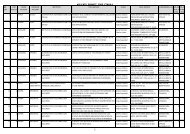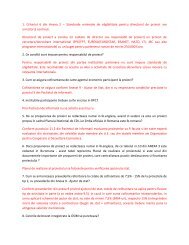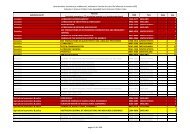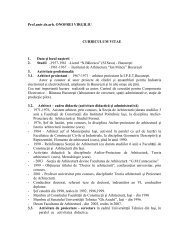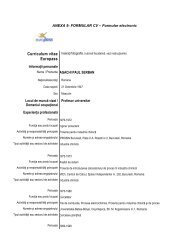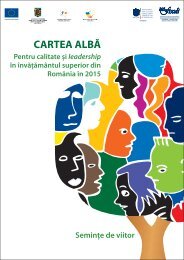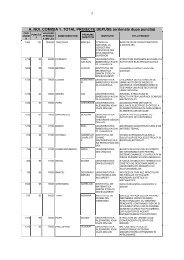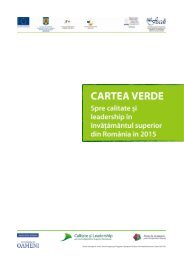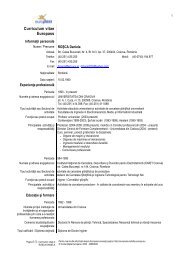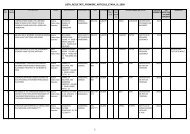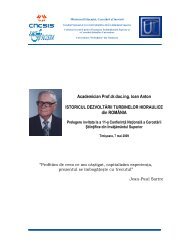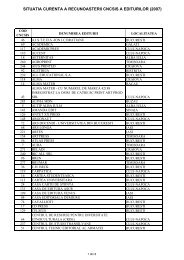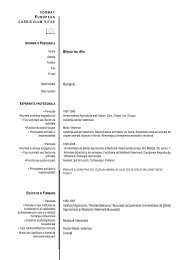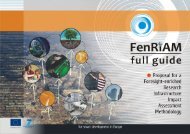Povesti de succes - uefiscdi
Povesti de succes - uefiscdi
Povesti de succes - uefiscdi
You also want an ePaper? Increase the reach of your titles
YUMPU automatically turns print PDFs into web optimized ePapers that Google loves.
Istoria <strong>de</strong>zvoltării infrastructurii<br />
<strong>de</strong> cercetare<br />
Centrul <strong>de</strong> cercetare în Neurobiologie și Fiziologie<br />
moleculară s-a înființat în 1999, când Universitatea București<br />
a avut acces la primele fonduri guvernamentale consistente<br />
combinate cu un împrumut <strong>de</strong> la Banca Mondială<br />
(800 000$ obținuți prin competiție CNCSIS-granturi B-50,<br />
D 22, C61 și CNFIS - grant C61).<br />
I<strong>de</strong>ile și interesele științifice premergătoare acestui moment<br />
au fost exprimate și susținute <strong>de</strong> profesorii Maria-<br />
Luisa Flonta, Grigore Strungaru și Doru G. Mărgineanu,<br />
care în 1995 au organizat un Masterat <strong>de</strong> Neurobiologie.<br />
Anii 1990-2000 fuseseră <strong>de</strong>clarați în comunitatea științifică<br />
internațională ca „Decada creierului“.<br />
S-au organizat laboratoare <strong>de</strong> electrofiziologie (patch<br />
clamp, voltage clamp), culturi <strong>de</strong> celule, imagistică <strong>de</strong> Ca,<br />
mo<strong>de</strong>lare moleculară pe calculator, studii comportamentale.<br />
Micul, dar entuziastul grup <strong>de</strong> neurofiziologie moleculară<br />
format din iniţiativa Prof. Dr. Maria-Luiza Flonta şi beneficiind<br />
<strong>de</strong> contribuţia valoroasă a Prof. Gordon Reid, a<br />
obţinut în ultimii ani o serie <strong>de</strong> rezultate notabile în explorarea<br />
termosensibilităţii, în studiul nocicepţiei şi durerii, în<br />
aprofundarea unor mecanisme fiziopatologice ale neuropatiilor<br />
periferice şi ischemiei neuronale, continuând<br />
tradiţia <strong>de</strong> peste un secol a şcolii bio-medicale româneşti. În<br />
ultimii ani membrii centrului au obținut finanțare pentru<br />
proiectele <strong>de</strong> cercetare propuse la CNCSIS, Viasan, Ceres,<br />
CNMP, ANCS, fapt care a facut posibilă <strong>de</strong>zvoltarea laboratorului<br />
<strong>de</strong> biologie moleculară. De asemenea există un<br />
proiect aprobat, care rămâne să fie finalizat: <strong>de</strong> creare a unui<br />
laborator <strong>de</strong> microscopie confocală.<br />
Resursa umană implicată<br />
Echipa centrului <strong>de</strong> Neurobiologie este foarte dinamică:<br />
în medie lucrează în laboratoare 9-10 cadre didactice, 10<br />
doctoranzi, 15 masteranzi. Fiecare postdoc sau doctorand a<br />
efectuat stagii <strong>de</strong> lucru în laboratoare europene cu tradiție<br />
Presentation of the Developed<br />
Research Infrastructure<br />
The research centre in Neurobiology and Molecular<br />
Physiology was established in 1999, when the University of<br />
Bucharest had for the first time access to substantial funding<br />
(from the Romanian Government and a loan from the<br />
World Bank - 800000 $ obtained in CNCSIS project competitions<br />
- grants B50, D22 and from CNFIS, grant C61).<br />
The scientific i<strong>de</strong>as and interests materialized in these<br />
grants were promoted by Professors Maria-Luisa Flonta,<br />
Grigore Strungaru and Doru G. Margineanu, who had organized<br />
a Master's Degree in Neurobiology in 1995. The<br />
1990-2000 period was <strong>de</strong>clared by the international scientific<br />
comunity as the Deca<strong>de</strong> of the Brain. We managed to<br />
set up laboratories of electrophysiology (patch clamp,<br />
voltage clamp), cell cultures, calcium imaging, molecular<br />
mo<strong>de</strong>ling, behavioural testing.<br />
The small but enthusiastic group of molecular neurophysiology,<br />
established at the initiative of Prof. Flonta and<br />
benefiting from the valued contribution of Prof. Gordon<br />
Reid, has obtained in the last few years remarkable results<br />
following the investigation of mechanisms involved in<br />
thermo-sensitivity, nociception, peripheral neuropathies and<br />
neuronal ischemia, continuing the century-old tradition of<br />
the Romanian bio-medical school. In the last years the members<br />
of the centre have obtained funding for their research<br />
projects from CNCSIS, Viasan, Ceres, CNMP, ANCS,<br />
which ma<strong>de</strong> possible the establishment of a new molecular<br />
biology laboratory. Moreover, there is another approved<br />
project, which will be finalized in the setting up of a mo<strong>de</strong>rn facility<br />
for confocal microscopy.<br />
Human Resources<br />
Laboratorul <strong>de</strong> mo<strong>de</strong>lare moleculară<br />
Molecular mo<strong>de</strong>ling laboratory<br />
The team of the Neurobiology Centre is very dynamic:<br />
on average we have 9-10 scientists at post-doctoral level,<br />
10 PhD stu<strong>de</strong>nts and 15 Master's stu<strong>de</strong>nts working in our<br />
laboratories. Each post-doc and PhD stu<strong>de</strong>nt has benefited<br />
from research stays in European laboratories in university<br />
Research Center in Neurobiology and Molecular Physiology<br />
37



